Theatre Reviews
(IN)VISIBLE - Shadow Syndicate

Shadow Syndicate are Buxton Fringe old-timers and their latest show [In]visible, will be their fifth time at Underground Venues.
This year's thriller is about 'the carrier' Sam and his search for the answers after being abandoned at birth, whilst a group of unknown agents secretly conspire against him.
This show doesn't hand all the answers on a plate and constantly keeps the audience guessing. Although the Pauper's Pit wasn't quite big enough for all the actors on stage at once, there were some well choreographed movements sequences that were dramatically powerful.
There were some very engaging moments particularly when the cast recreated a train for the climax of the show. In fact the show as a whole was well directed, with choreographed scene changes and carefully placed set.
The script, written by the company, is incredibly detailed and the actors have a big job in remembering all the complicated sections of dialogue, particularly from the agents. The overlapping dialogue was effective and well placed, adding to the chaotic arguments.
I think the use of the narrator could have been further employed to add greater context to the story at the beginning, just to give the audience a little help.
Sam, played by the talented Kaylum Vella gave a very honest and emotive performance and worked hard to carry the show throughout.
Overall the latest piece in the Shadow Syndicate repertoire is an ambitious and stylish show and it's great to see a great asset to the Fringe back for another year.
Sian Dudley
A DANCE WITH THE DEVIL - Delirious Theatre Company

A Dance with the Devil is a new play by a new writer, David Reeve, presented by a young company. Delirious Theatre was formed last year by graduates from the University of Derby. The Fringe exists precisely to provide a platform for such young and energetic groups.
A Dance with the Devil is described as a dark comedy. Delirious summarise the idea behind the story as follows: A horrific war that has rendered humanity on the verge of extinction, two survivors desperate for their salvation venture into an old Funeral Home in a final bid to find some food. Deep within the recesses of this building they find something that they could never have imagined. A deranged funeral director called Calcifer, who as well as being in possession of the food they desire, is also harbouring something far more potent, the son of the morning, Lucifer.
In this account Lucifer is the older brother of God - but by his own admission he is not as bright or as clever as his younger sibling. Though evolution was his idea, says Lucifer, God ruined it. Lucifer also feels that his character has been trashed by the lies told in the Bible. This explains his everyday appearance - his lack of horns and goat's legs. Of course we are dealing with the Devil here - so should we believe his protestations of innocence? There is a lot of cheerful blasphemy in all this, of course, though there is no sense that the purpose is to offend.
Osmond - one of the human survivors - seems genuinely dim and struggles to comprehend what he is involved in and is happier talking about cartoon stories. So when he agrees to gamble with the Devil you'd not back his judgment or chances.
A new play by a new writer is likely to need work doing to it and presumably these performances will give David Reeve the chance to spot the lines that don't do what they were designed to do. Working in the confiners of the Pauper's Pit also gives the cast the chance to feel the audience reaction and respond to that. The cast of four works well together and there are moments of real tension and drama here. This production - alongside Scars upon my heart - is testament to the strength of work being competed at the University of Derby.
There are further performances of A Dance with the Devil on 5th and 7th July.
Keith Savage
A LOT OF IT ABOUT - Organised Chaos Productions

In his fifties and still trying to come to terms with his sexuality, Ben revisits his younger self and key events in his past including his homosexual relationship with Kev, aversion therapy to "cure" him of his homosexuality and his marriage to Ann.
This could be a confrontational play full of resentment at the injustices of an unaccepting past, and there is plenty of anger here, but Ned Hopkins' script also treads a richer more subtle path. The compromises Ben and Ann have to make are sensitively portrayed and the horror of Ben's electric shock treatment is conveyed equally by being both funny and sinister, incisively pinpointing that the medics have no idea what they are doing and what the effects might be.
Michael Whittaker returns to the Pauper's Pit stage as Young Ben having previously appeared last year in the award-winning Afterwords. It's good to be able to see actors develop in their craft and he gives a strong performance that carries the heart of the play and touching relationships with Kev (John Dayton) and Ann (Kate Mitchell). While the younger Ben's story is told, the rest of the cast remain on stage at all times, creating a claustrophobic sense of the scrutiny that Ben constantly feels under.
Older Ben is so wonderfully played by Brian Gorman it's almost a shame that he doesn't have more to do. It is a performance of depth and sympathy of a man crippled both emotionally and physically by the turmoil caused by being unable to come to terms with his sexuality. The impact on others of the lie that Ben is forced to lead is delicately brought out by Tracy Gabbitas as the older Ann, though I would have like to have seen a bit more of how Ann justifies those compromises to herself.
A Lot Of It About works as an interesting companion piece to Organised Chaos' other production at the Fringe, Broken, both look at the inappropriate use of drug and other therapies in addressing personal issues.
Organised Chaos has been bringing well-crafted thought-provoking plays to the Fringe for a number of years. This is a worthy successor to successes such as Afterwords.
Steve Walker
A SENSE OF FALLING - All Things Considered Theatre Company

This piece is what my Fringe is all about, exciting, innovative work that makes your brain spark and think, a piece of theatre you would have great difficulty ever seeing in Buxton at any other time.
The programme describes A Sense of Falling as a work in progress by a collective of creative practitioners. Don't be alarmed, I have seen many attempts at physical theatre where their final performance is nowhere near as engaging as this. It is an immersive piece that sweeps the audience into the life of Danny and his downward spiral. We question who is the cause of Danny's problems? There are no answers the audience has to think about what drives a character. Influences of Complicite and Frantic Assembly can be seen in this piece. There is a mixture of recorded and live voice, which adds to the soundscape of confusion and helplessness. Paper being ripped by others around Danny shows how they are all influencing his life and things are falling to pieces.
Many times I felt anxious and overwhelmed, I was feeling as Danny was and at times just wanted the frantic nature of the piece to stop. But then there would be silence, a moment of naturalism and a time to catch my breath. Danny is surrounded by his life, his timeline, props, characters and sand, lots of sand. Repetition is a key motif; moments are played and then replayed with alterations and exaggeration.
The cast played as a true ensemble and although John Skilling played Danny brilliantly without the others his role would be nothing. Full credit goes to Emma Bramley, Louisa Brown and David Coggins who directed and devised 'A Sense of Falling'.
Be challenged go and see it.
Jayne Marling
AN EVENING WITH CHARLOTTE BRONTE - Little Red Hen Theatre

I must confess that even though Jane Eyre is one of my favourite stories, I don't really know a great deal about its author Charlotte Bronte, or about any of her other works. I therefore leapt at the chance to go and see 'An Evening with Charlotte Bronte' by Little Red Hen Theatre.
The venue of Buxton Methodist Church felt like an odd place to see such an intimate production of Charlotte (played by Prudence Edwards) revisiting her works after the death of her siblings - there is certainly nowhere for the performer to hide backstage during the 70 minute performance. There is also the small matter of it being quite a public building, which could produce distractions for a lesser performer. Prudence however, dealt with everything with ease, maintaining her character and composure throughout what was a very demanding piece to perform. The list of works that we were led through could have felt very disjointed, but Prudence linked each piece together beautifully, in a way that very clearly marked when one had come to an end and another was to start (the list of works provided on the seats helped the novice a great deal in this too!). Her delivery was clear and lovely to listen to - it certainly made Charlotte Bronte's work feel more accessible and real. It was also wonderful to feel Bronte's own character being revealed, something which can often be overshadowed by the works that she produced. If anything I would have liked to hear more of Charlotte Bronte's letters, but this would certainly have made the production longer and feel potentially heavier. As it was the time flew by, and I left feeling that I could happily have stayed and listened to more. Prudence well deserved the rapturous applause that she received at the end of the performance - a lovely and clever production that deserves to be seen by many more.
Emma Thompson
AROUND THE WORLD IN 80 DAYS - Uproot Theatre Company
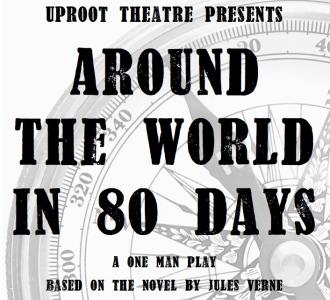
Uproot Theatre prides itself on producing 'fresh new takes on established classics'. The Strange Case of Dr Jekyll had an excellent reception at the Buxton Fringe in 2012, and this year Around the World in 80 Days, another literary adaptation by Richard Wiseman, presents the festival with an engaging one-man show, which successfully draws the most exciting elements of Jules Verne's 1873 adventure tale into an hour-long performance. This is the second show that Uproot Theatre has taken to the Buxton Fringe; it's a consistently witty enactment that is a pleasure to watch. Wealthy bachelor Phileas Fogg makes a bet at the Reform Club that he can circumnavigate the globe in 80 days. Accompanied by his valet Passepartout (a play on words, designating a key capable of opening any door), he dashes from Egypt to India, the Far East and America in a frenzy of exclamations and good-natured high jinks. True to form, Jamie Robertson's Fogg is an excitable, ambitious, and immediately likeable individual.
Loyalty to Verne's original text is conscientiously exercised, and the script is filled with quotations from the novel in translation. Robertson delivers these admirably as Phileas, but the strongest part of his performance lies in his alternating between all the other characters that feature in Fogg's adventures; he switches between them in rapid conversation with great aplomb. His repartee between Fogg and an unruffled Indian train conductor is particularly well executed. Robertson imbues each character with their own accent and mannerisms, from Passepartout's sense of unfailing duty and loyalty, to the pillar of Britishness in Sir Francis and his upper lip of unfailing staunchness.
From extensive adventures in opium-smoking, to the subtle use of music to lend a potent atmosphere to a suttee procession in the Indian jungle, Wiseman's adaptation is an entertaining one. With the use of only a few props, the creativity of this piece is hugely enjoyable; a chair becomes a train, an elephant, a horse and a hansom cab in turn. Around the World in 80 Days is fast-paced and engaging, dotted here and there with 'Herculean wit', and plenty of whist.
Colette Talbot
BIN LADEN: THE ONE MAN SHOW - Knaive Theatre

The audience are disarmingly greeted by a charming man with tea and biscuits. He affably invites, "Call me Abu." Then he tells a story of just how he set about to change the world in six difficult and clearly unplanned steps; how he blew raspberries into the face of the potent Soviet empire and embarrassed the might of the US of A.
In this powerful world premier, actor and co-writer, Sam Redway provides a "one man" warts-and-all challenge to the perceived wisdoms and politics of the East and West in his honest search for justice. Breathlessly portrayed, this is a human story of one man's endeavours to make a difference - it becomes a tragic tale of gain and loss and world renown and ultimately failure (I'm not giving the ending away as we all know our recent history!).
At times the audience is made to feel like a group of management trainees on a motivational seminar before being thrown into the brutal role of Mujahideen warrior: Bin Laden asks "What would you do in this situation? Find your motivation and focus upon it!"
A smiling assassin, monster, puppet master or bogeyman? Or freedom-fighter, devout religious man and righter-of-wrongs? You decide. The plentiful facts are there for you to make your own mind up...and if you can't decide, there's an invitation to join Sam and co-writer and Director, Tyrrell Jones (or Toby) in the bar to discuss it further. Sadly co-writer, Joseph Wilde has other commitments and can't be around.
This is what the Fringe is here for. New writing on a touchy subject, which is brilliantly and energetically delivered. A piece of remarkable and provocative theatre that we are privileged to be the first to be able to enjoy.
David Carlisle
BROKEN - Organised Chaos Productions
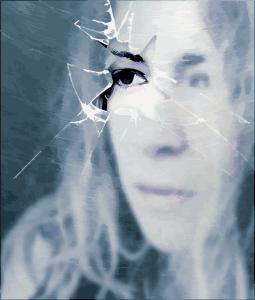
As May is struggling to come to terms with a trauma, she is drawn to the two extremes of Tom, the over-protective solid boyfriend, and her free spirit independent friend, Carla. Broken investigates what is true and what is delusion, whether May can find herself again and what treatment gives her the best hope of recovery.
The personal story of delusional May is intercut with a wider look at her treatment, which brings in a conflict between the options available; a drug-based regime, or talking therapies. This aspect of the play is explored through May's doctor, Helen, who is recovering from the loss of everything she had hoped for, and recognises her own need to talk over the deadening effects of the drugs.
It is a nicely constructed play by Ella Carmen Greenhill, the fractured narrative replicating the confusion in May's mind features clever recurring metaphors which come together neatly at the end as the story coheres.
The effect of the fragmentary nature of the story-telling is that the piece sometimes feels dominated by monologue, particularly in the role of the doctor which bears the brunt of the exposition and at times is a bit didactic. However, Una Love handles this difficult role remarkably well as she handles the contrast between Helen's professional role, personal tragedy, and the insight this brings to May's case.
It is a play that asks a lot of its actors. Hannah Keeley creates a complex and flawed character in May, the different aspects of whose personality is brought out in the relationships she has with those around her, and Emma Cliff's infectious energy as Carla introduces some joy and lightness.
It is a thoughtful and intelligent look at the issues around mental trauma, our reactions to it and how best to enable recovery, with much humanity to commend it.
Steve Walker
BURTON'S LAST CALL - George Telfer
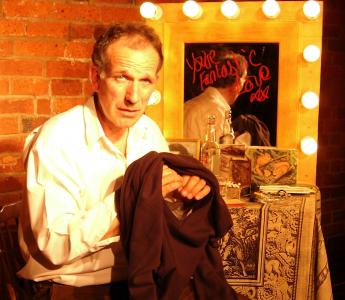
It seems the road from Wales to Hollywood is strewn with vodka, cigarettes, and beautiful women. Waiting in the wings on the first night of a Broadway production of Equus, which marks a return from a twelve-year absence from the stage, Richard Burton reflects on his stratospheric rise from humble beginnings in a Welsh mining town to becoming one of the highest-paid actors of all time. Written and performed by George Telfer, whose performances have included portraits of Prince Philip (written by Steve Haythorne) and Sir John Gielgud, Burton's Last Call returns to the Buxton Fringe this year, and on the first evening the venue was already full.
Telfer delivers an eloquent soliloquy, and his Burton muses over the uproarious lifestyle that accompanied his rise to fame with a quiet composure alien to the highly-publicised excesses of certain Hollywood stars. Quotes and snippets drawn from Burton's interviews are woven into a text that forms an elegant portrait of a man still in living cultural memory. It's a study of the world's obsession with celebrity - while Burton's relationship with Elizabeth Taylor simmers on the set of what would prove to be the most expensive film ever made at the time, Cleopatra, his disdain of the media's interest in his love life is brought out with sharp sarcasm. He suggests reporters might have more interesting stories to discuss: the Cuban missile crisis, for example.
Telfer's beautifully delivered script gives him ample opportunity to examine Burton's character; though his accent is a merging of Burton's composed tones and a drawl more reminiscent of the Duke of Edinburgh, his delivery is impeccable. His performance captures a series of shifting undertones in Burton's easy manner with great success, from his lingering sense of guilt at deserting his first wife, Sybil Williams, to his look of total unsurprise when a 'very nice, very young, very earnest' doctor tells him that his liver is 'too big'. It's hinted that Burton relied on drinking during his career to fill an empty space - one familiar to a great number of creative behemoths from Hemingway to Dylan Thomas, together with the pursuit of a hellraising lifestyle. "No-one understands boredom quite like me." sighs Telfer's incarnation, "Except Marlon Brando."
The piece also examines the opposing pulls of theatre and film over the course of Burton's career - he blithely turned down a fat Hollywood contract in favour of a run of Hamlet at the Old Vic for £45 a week. Shakespeare, for that matter, is treated with great affection and slight weariness ("Hamlet? For the hundredth time?"), and Henry V's 'Once more unto the breach' is rattled off backwards with barely a flicker of irony. Burton's Last Call isn't merely a biographical sketch of Burton; it's a gesture of reverence in honour of the dramatic arts and its history.
Colette Talbot
BURYING YOUR BROTHER UNDER THE PAVEMENT - AQ Youth Theatre

Following their hat-trick of Youth awards in last year's Fringe Awards, AQ Youth Theatre return to Buxton with expectations high. Whilst last year's Bald Prima Donna was a slick, highly regimented interpretation of Ionesco's absurdist drama, Burying ... is somewhat looser, a bit more rough around the edges and tells a rites of passage story of death, forgiveness and sexual awakening.
Following the stabbing of his brother, teenager Tom leaves home and begins to sleep rough on the spot where his brother died, where he concocts the plan of having him buried under the pavement - memorialising the place he died rather than his life, since it transpires he knew very little about him. This a process of discovery, as he meets a variety of larger than life characters and discovers the truth about his brother's life and death.
Jack Thorne's play is a slightly odd mixture of angst-ridden realism, caricatured supporting characters and musical interludes which requires the group to be stretched in many different directions. The musical numbers, led by Amy Thiele, were well done, but could have been linked more seamlessly into the action. Director Jake Martin can easily tighten up these links and also might be advised to remove any references to the play being set in London - with some tiny changes to the script it could be moved to Manchester and the jarring note wouldn't be struck.
The central performances were truthful and heartfelt, but slightly lacking in finesse. Luke Halliwell as Tom captures the character's confusion and insecurity, but work was needed on his diction, particularly in the echoey confines of the URC, where a lot of his dialogue was lost. Alongside him, Joe McGrath's Tight is well realised, beginning as a comedy hard man but gaining sensitivity as the play progresses, and Hannah Mullaney play's Tom's older sister Courtney with a great inner strength and superb focus. To some degree, all these performances might be better suited to TV than stage, but are nonetheless commendable for all that.
AQ Youth Theatre remain an interesting addition to the Buxton Fringe and I hope we see more of them in the future.
Robbie Carnegie
CASUAL ENCOUNTERS - NoLogo Productions

The programme signposts the heading this short play will generally be taking, but not the full route-map. I don't want to give too much of the game away but there is some partial nudity. Excited are we? This is one of the themes the play's author, Andy Moseley, entices you in with.
Just imagine it's your first time wife-swapping, or more correctly it seems, 'swinging'. What could go wrong? No, really, what could go wrong? Well it more or less does in this piece. Whilst there are surprises and laughs along the way, there is lurking underneath, are more serious points to be made.
Casual Encounters is an exploration of marriage (the institution), relationships (being married), gender roles, class, mores and more. Each is interwoven into a strong piece of theatre which sits well amongst this year's productions here at the Fringe. The acting is assured and the direction crisp. This was I believe the first time an extended version of the work has been seen and I must say that it works very well. I can certainly recommend it to you.
Ian Parker Heath
CHOOSE TO BE HAPPY - Proper Show

This light hearted show was going to be called 'A Hot Day In Buxton' which is the name of a poem about unlikely occurrences written and performed by Deirdre Costello. Given the heat wave we are currently experiencing in Buxton, it seems fortuitous that instead she named the show after another of her humorous verses 'Choose to be Happy' which proved to be a bit of a theme for the evening.
Talented professional musicians Alex Butler and Graham Clarke opened the show with light upbeat guitar and fiddle music that then served as punctuation between sketches, stories and poems from Deirdre. Quite a few of the pieces from Deirdre's original spoken words had a local them or inspiration including 'Wild Man Piggott' from Accrington, one based on the Angel on the Slopes in Buxton, 'The Wise Woman of Whaley Bridge', and a 'Buxton's Got Genius' rouse to introduce young Mike Featherstone who shared his original song 'The Girl With The Golden Touch', sung with gentle maturity.
We were introduced to a number of characters including Cheryl the Char, 'The Girl in the Lime Green Coat', and a 94 year old lady. We also heard about; 'The Great American Diner in the Sky', 'The Angel at the Door', and 'The Fairy Tale Women's Collective'.
As you may be starting to gather this was a very varied evening of entertainment from a group of local writers and performers in different media and styles who have come to know each other through local open mic nights and pub gatherings. We had instrumental music, performance poetry, a singer songwriter, storytelling and thoughtful sketches from at least two different generations. The unusual mix worked largely because of the evident friendship and appreciation between the performers who put the show together specially for the Fringe. The spirit of the Fringe as embodied by this 'have a go' group was nicely summed up by Deirdre's final line 'Life is for Living!.'
Jean Ball
CONFESSIONS OF A WAITRESS - Stephanie Claire and Teacup Theatre
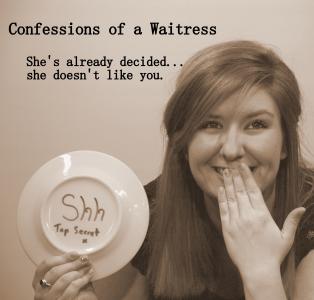
If you are of a certain age, you may remember there was Robin Askwith's series of films/books based, loosely it must be said, on 'confessions'. Thankfully, this was nothing like them. What you have instead is by turns, a humorous, vivid and sometimes thought-provoking insider's view of just one aspect of Britain's service industry. The lowly waitress.
Stephanie Claire has drawn upon her time as a waitress to offer us a portrait of this oft-forgotten, much put upon and rarely appreciated member of our society. Seemingly at every customer's beck and call, with no life beyond the constant scurrying after your needs, she shows how we with our thoughtlessness and indifference can impact the lives of others who aim to help us. This is not to say it doesn't have its humorous side, but 'Two Soups' it is not.
There are party-poppers and cake, spoon dancing and even a free glass of wine if you sit in the right spot. Stephanie is confident with her material, she should be, she lived it, and her performance is strong and energetic. Despite what you'll hear, her hair is ok.
This is a brave attempt to show the many facets of waitressing (and waiting?) and just what we all take for granted. Like many other skilled jobs, if done well, you don't notice - it is only when it goes awry do we react and attend. A fine show - do go and see for yourself.
Ian Parker Heath
DARK DEEDS - GlovesOff

Patricia Hartshorne is a star!
Peter Dobson, pianist and guitarist, beautifully opened and closed the performance with a Nino Rota medley from 'The Godfather'. His wife, who collected our tickets, was also the 'La Russe' in Patricia's French, hugely funny, rendition of 'Frankie and Johnny'.
The show used song to explore the darker side of humanity over the last 100 years from the singular horrors of people like Jack the Ripper to the global horror of Hitler including a scathing, but humorous, attack on Bankers and the Coalition (with a couple of stabs at the Labour party too). She mixed horror and injustice with her uniquely comedic style both in her songs and in the anecdotes that separated the pieces.
The music varied from Cole Porter, Bertolt Brecht, Billie Holliday, Lottie Lenya and performed in different styles, Marlene, Music Hall, very nearly 'Iron Maiden'. She used a variety of accents, cockney and toff and included a couple of songs sung in French and German.
Patricia Hartshorne talked about our dark deeds in the last century with humour and social depth, at one point earnestly relating the story of Ruth Ellis, the last 'executed' female in the UK, who today would have been seen as a victim not a perpetrator.
I don't want to give the impression that this performance was 'heavy', but the audience moved from raucous laughter at one moment and then silenced in the next by a reminder of darker events.
I especially enjoyed the German rendition of 'Mac the Knife' ('Die Moritat von Mackie Messer') was which closed with revelation of the Nazi undertones of the song.
Those of the audience who were bemused at the start of the show, with her multitude of props hidden about her person, sometime not easily accessed, were rapturous by the end.
A well investigated and entertainingly expressed piece of theatre and song. Thank god for Wickidpedia!
Martin Wood
DIABETIC PENGUINS - Frantic Sleepers

Fast paced and frantic, this debut piece is a sensitive and intelligent portrayal of the struggle that many young people consumed by mental illnesses and personal struggles beyond their control face when searching for a place in society. Jess Lee pulls in her audience with a clear understanding of the issues her writing portrays with a light wit and humour. But she also strikes with moments of sensitive and uncomfortable truth, cutting below the surface and bringing forward ignored but prevalent problems that exist within our society.
Diabetic Penguins is delivered by the strong cast of Jarreau Benjamin (Jamal), John Bulwich (Ryan) and Ed Jaundrell (Danny) who hold a clear chemistry and palpable dynamic. Each character touched on a different area of mental illness and made it their own, delivering their parts with layers of subtlety; their issues creeping up on you a lot slower than their vibrant personalities.
There are moments when you are laughing and are drawn into the light conversations, quick humour and easy scenes presented by the three actors. Then you are stopped short by glimpses of the unraveling of each character, slowly realising that they are being trapped and destroyed by their illnesses. These moments drive home the point that young people in this situation are struggling with identity, stigma and stereotype on a daily basis, often met with medication over social inclusion.
Cleverly written and delivered with energy and strength, the play is not without its 'clunky' moments. Sudden scene changes, unrelated musical interludes and a few hazy line moments, suggest that perhaps the play could have benefitted from a director who wasn't the writer to fully explore the character, staging and physicality of the performance.
Philippa Hurst
DOG ROUGH - Anna Beecher

Some events at the Buxton Fringe defy description and Dog Rough is one such 'happening'. Written and produced by Anna Beecher, Dog Rough is (like her play with Fat Content, The Man I Cure, which remains one of my all-time favourite Fringe shows), an exercise in sensory immersion in drama.
Donning a leather jacket and given an MP3 player, complete with large headphones, I was dispatched to the park, where, as I walked around, I was treated to an audio drama. The play, performed by Remmie Milner and Jack Holden, centres on two strangers in a park. Putting my hand in the pocket of the leather jacket, I found props which connected me to the man in the play, and, feeling distanced from the other people in the park by the play running through my head, I began to connect more and more with the disaffection of the two characters depicted.
Dog Rough is a fascinating glance into two lives, a tragic story of misunderstanding that forces us to face our preconceptions - by entering the psyches of its two characters, we no longer objectify people who our prejudices may label as 'chavs', or whatever the latest cultural bogeyman du jour might be. It's good to see (or at least hear) the work of this talented theatrical practitioner in Buxton again after too long an absence.
Robbie Carnegie
EXTREME WITHDRAWAL IS MANIFEST - Scrunchie Theatre Company
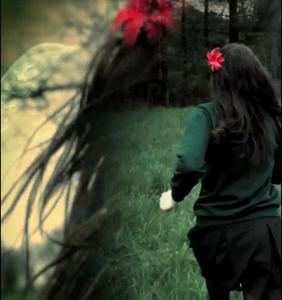
Extreme Withdrawal is Manifest opens with a mother traumatised by the disappearance of her daughter, Rosie, then looks back at the girl's mental instability and the issues and incidents leading up to this moment. It is an uncompromising look at mental health, and the difficulties faced by friends, professionals and most poignantly, her mother, in trying to connect with someone who has, in effect, gone missing long before her physical absence.
The play investigates the girl's problem from all angles, the two actors (Alice Smithson and Laura Hills-Leigh) donning a range of masks to play the range of people involved in Rosie's life; a child she babysat, teachers, grandma, friends and other pupils. This showed the number of people affected by Rosie's withdrawal but also how easy it was for them to distance themselves from it. That is not possible for her mother, and Laura Hills-Leigh portrayed her with sensitivity, demonstrating by turns, tenderness, anger and despair at her inability to reach her daughter
The video clips were effective, particularly one speeded up sequence which illustrated the depth of the daughter's withdrawal and the difficulty her mother had in connecting with her. The use of different voices to represent Rosie's thoughts was shocking and disturbing, though I feel that her absolute withdrawal may be better rendered by having her internal thought processes similarly inaccessible to the audience.
All of the different techniques in use in the play were concentrated on Rosie's mental health and the impact it had on her and those around her, and it felt that the play was rooted in workshop sessions on mental health rather than arising from a desire to tell a particular story. The background to her condition may be better presented in dialogue, rather than in didactic segments which reference academics. Curiously, we only learn the probable reason for Rosie's extreme withdrawal at the very end of the play, but as the play's focus is on the withdrawal itself rather than a mystery behind it, I don't see there being a problem with the audience knowing the reason for it earlier, as it would fully engage their sympathies with Rosie and her mother.
Extreme Withdrawal is Manifest has been put together with great care by Scrunchie Theatre Company and at its best is a harrowing illustration of the effect on a mother of the loss of her daughter, who has emotionally completely withdrawn long before her physical disappearance.
Stephen Walker
GODSTAR - MY Inter-Theatre Company

In the early 70s, two musicals, Stephen Schwartz's Godspell and Tim Rice & Andrew Lloyd Webber's Jesus Christ Superstar, changed the face of musical theatre. On paper, these two musicals might seem ideally suited for a Glee-style mash-up, both being based on the New Testament of the Bible, and in Godstar, MY Inter-Theatre Company attempt to bring these two works together.
It has to be said, however, that the two shows are very different animals, and don't sit altogether comfortably side by side. Godspell is basically a presentation of the Parables, told in a disarmingly wide-eyed naivety (in the original productions the actor playing Jesus appeared as a white-faced clown), whilst Superstar is, in many respects, not a religious work, dealing with Jesus and Judas as men (eg the refrain from the stand-alone hit I Don't Know How To Love Him: 'He's a man, he's just a man'), struggling with the destiny awaiting them.
That said, the MY company, who clearly approach the project from a deeply felt faith, bring a sincerity to the whole proceeding that goes some way to squaring the circle of bringing these two works together. This was especially true of the Godspell segments, where I usually find in slicker productions, its homespun, 'let's put on a show right here' character fake - here it came across as truthful and touching.
The Superstar elements were slightly more problematic. There were some strong voices amongst the 20-strong company - especially the actor portraying Jesus and a number of the actresses - but numbers like Heaven On Their Minds and Gethsemane are a Big Sing, requiring vocal and dramatic resources that few can muster, and which here proved a big ask. In many respects I think the company had decided to bring the two shows together to resolve perceived issues with the two shows - the lack of narrative of Godspell, the lack of overt Christianity in Superstar - but here I think a straight-down-the-line presentation of Godspell alone might have been more advisable.
That said, this is a production - and a company - to applaud, due to its sincerity and its inclusivity. The company contained many actors with disability, and their involvement in the project, and the fulfilment it obviously gave them, was moving and heart-felt - and what theatre should be all about.
Robbie Carnegie
HAMLET IN POOLE'S CAVERN - Butterfly
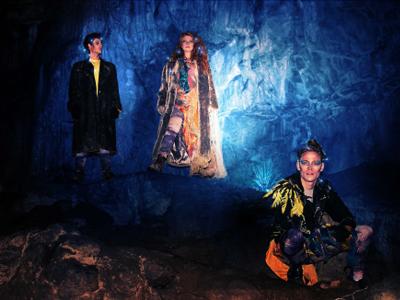
We are welcomed into the creepy crypt by the acapella vocals of the ensemble cast when suddenly out of the eerie darkness... a ghost appears.
Hamlet is a fast paced and genuinely scary promenade performance brought to you by the brilliant Fringe favourites Butterfly Theatre. The familiar tale of a prince who sets out to avenge his father's death is perfectly placed in the spooky Pooles Cavern, and the setting provides a scary backdrop of strange echoes and intense shadows.
The story is condensed into just over an hour and retains all the favourite moments and quotes boldly delivered by the large company. The experienced cast led the audience around confidently and used drumming or clapping to speedily guide us through the cave.
The young and somewhat high-pitched Hamlet (Edward Hulme) brought a lot of energy to the performance, as did the majority of the largely talented cast who were at ease in the rough terrain of the cave. The performers created a really accessible adaptation, with lots of easy to understand, short scenes and engaging physical sequences. Laertes (Ralph Taylor) in particular gave a very powerful performance and drove the momentum of the play's final moments right up to the eventual climax of the show.
The scene transitions were smoothly executed and the team sustained the high tension throughout, despite the challenges of a moveable show. In fact it's quite an immersive and tense experience since the actors seem to creep up and jump out at you!
I would recommend bringing warm clothing and a decent pair of shoes as although the cave temperature is a mild (for Buxton) seven degrees, seventy minutes is a long time just to be in flip flops - classic school boy error on my part. Never the less I was thoroughly entertained and believe it would please the Shakespeare boffins and beginners alike.
Butterfly Theatre build on their success of previous Fringe productions A Midsummer Night's Dream and Macbeth to make this a brilliant festival experience that will definitely give you the 'Willy Shakes'.
Sian Dudley
HAPPY JACK by John Godber - library theatre touring company

Happy Jack was shown in the URC green room on a very hot evening by The Library Touring Theatre Company. It is a testament of how well the story was written that the audience were engaged throughout.
John Godber's Happy Jack is one of his earliest plays and is a good example of his early forays into multi role playing actors and the dissolution of the fourth wall which pervades much of his later work. The story is based on the life of Godber's own Grandparents; it starts at the end of their story and jumps back through time; retelling events in their shared life. At the start the two actors introduce themselves and give a flavour of how the play will be told.
It is a gentle story of two people who care about each other very much but, obviously, being from West Yorkshire and of a certain generation, would never admit to that! Happy Jack is called so by his wife Liz because he is a miserable man, not because he is unhappy, but because he is a Yorkshire man who has to keep his softer emotions inside. Jack is a fighter, a lover of music, a poet, a miner, a husband and father. They argue, they laugh, they listen to music, he works down the pit and writes poetry, she manages the house and is anxious. The relationship is an instantly recognisable one for anyone with West Yorkshire Grandparents from that era.
The set is simple, two chairs, a wire clothes dryer with various costume changes on and a table with a CD player. The scenes were simply changed by moving the chairs to represent a different location.
Roger Cook and Deborah Kelly capture the relationship between these two characters and tell their story in an engaging manner. There were moments where the audience were laughing and other times where they were smiling in gentle recognition. It is interesting to watch as a vignette of a West Yorkshire working class couple from a bygone era.
Jayne Marling
IN A LAND MUCH LIKE OURS - Breathe Out Theatre
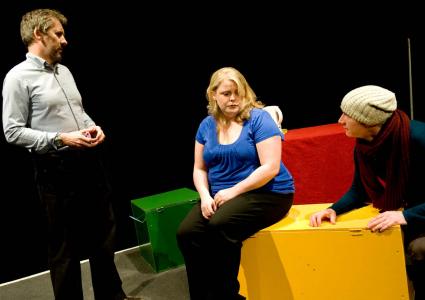
When we enter the auditorium we are confronted by two men; one plays with a phone, the other is reading a book. Dominating the stage is a pile of brightly coloured boxes, toy boxes, perhaps. But as well as toys, these boxes also contain books, moreover they also contain ideas. Chief amongst these ideas is Carl von Clausewitz's assertion from the heart of the standard text on military doctrine, On War: "War is the continuation of politics by other means."
It is a chilling statement, and one that has been used most recently to describe the Iraq War. However, it wrong-foots us for we are not in the theatre of large-scale political gesture, but rather in the middle of a domestic situation, and as the play progresses it becomes clear that it is not a war that is being described, but a battle; the age-old battle of the sexes.
David and Jane - played with subtlety and an eye for detail by Laura Lindsay and Andrew Roberts-Palmer - are a nice, middle-class academic couple planning a birthday party for their only child, Evie. He is a lecturer in engineering, she a teacher. He is rational and seeks an explanation for everything. She is emotional and caring. We see how their archetypal male/female responses to the world govern everything, even the death of their daughter.
In an unspecified incident several people are killed in McDonalds, including Evie. What follows is an examination of how grief affects people differently, tears a family apart and how the irrational is sometimes more understandable than the rational.
The linking device is Richard, played with engaging physicality by Adam Urey. He gives us a spin on Jack the Giant Killer in which the killer becomes the giant and also represents the perpetrator of the atrocity. At times both other characters engage with him, but mostly he is there, commentating, cajoling and mocking their plight.
Rob Johnston's play is engaging and frustrating in equal measure. It paints its ideas in the broadest of brushstrokes, but is also capable of great subtlety and tenderness. Its central debate: that men destroy, while women create is annoyingly simplistic, but presented winningly by its talented cast.
Jack's response to the problem of the giant is to meet violence with violence, mirrored in David's fantasy about facing Evie's killer. We are told on several occasions that Jack is a "clever little prick", thus coupling rationality with sexual inadequacy. The saintly Evie - eerily conveyed by her giggly answer phone message - used to "sit and listen", a contrast with David who constantly wants to actively find things out.
By the end of the play, David and Jane have split up. A reconciliation of sorts is hinted at. Jane is (rather conveniently) pregnant. She is nurturing, as a mother and a teacher, while David in constantly seeking answers has destroyed his marriage and his career. He is saved by the promise of more nurturing and the lesson of this particular fable has been taught: knowing isn't everything.
Malcolm Lomax
JORDAN by Anna Reynolds with Moira Buffini - Stickleback Theatre Company
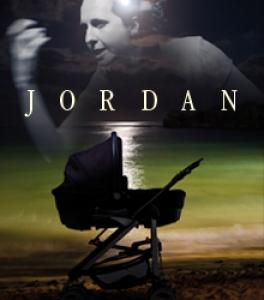
Jordan is a tough and powerful piece of theatre that tells the true story of Shirley Jones' journey from the faded seaside town of Morecambe, through domestic violence and mental illness, to Holloway Prison where she awaits her fate. Throughout it is intercut with a retelling of the Rumplestiltskin fairy tale.
It is a harrowing story and not necessarily a comfortable watch, but it is compelling as we follow Shirley in her youthful enthusiasm as she runs away with Davy in an attempt "to lead a shiny life". It's a dream that quickly turns sour as her pregnancy, abuse and abandonment take their toll on her mental health leading to her cataclysmic act.
Sian Weedon's performance is superb; her control as she switches from the Rumplestiltskin storyteller to Shirley is remarkable, with the characters being fully delineated through her physicality and her voice. Weedon's portrayal of Shirley is exquisitely realised; her stance, her nervous tic of clutching at her clothes, her directness, and she is unafraid to use stillness and quiet to great effect. At times the language used by Shirley becomes too lyrical which doesn't seem quite in keeping with her character as it has been established, and just disturbs the belief in the character momentarily, but the force of the performance sweeps such doubts away.
While the play is powerfully written, there are times when it takes too long to get to the point, yet the motivation for Shirley's desperate act is dealt with too quickly. However, the integrity with which she refuses to look for excuses and acceptance of her position is impressively done. The device of inter-weaving the Rumplestiltskin fairy tale works well to offer temporary respite from the severity of Shirley's story, and to highlight the unreality of the world she often finds herself in.
This is not an easy watch but is well worth seeing for the central performance of Sian Weedon and the intensity of the story-telling.
Steve Walker
LADY OF LETTERS by Alan Bennett - library theatre touring company

Miss Irene Ruddock is a very literary lady; a lady of letters, you might say. With the aid of her trusty Platignum pen, a dear friend over many years she informs us, she puts the world to rights, posting missives to all and sundry.
Nothing and nobody escapes the tracer beam of her gimlet eye for wrongdoing. When we first meet her, she has just arrived back from the cremation service of a neighbour which, she has already told the funeral director, ran as though on castors and she disapproved of seeing the pallbearers smoking in the bushes. She has even written to the grieving family to reassure them that she spotted the funeral director's shortcomings but they did not respond, which she puts down to their grief.
The trouble, we discover, as Miss Ruddock unfolds her story to us, is that her trusty Platignum pen is the only friend she has. Whilst she enjoys some minor triumphs, such as forcing the local council to put a ramp over a broken pavement (which, she subsequently disapprovingly finds, to have been fouled by a dog so she writes to let them know), she has alienated everybody she has ever come into contact with. Not that she notices; even less would she care if she did.
As we shift between the banal and the comic, to the delight of the audience, some dark and disturbing episodes begin to insert themselves into the dialogue. The casually racist Miss Ruddock gradually becomes obsessed with a family that moves in across the road. There is a baby, thin, ill looking and bruised. She watches, increasingly concerned, as the tattooed mother and endlessly tinkering-with-his-car-father go out every night, apparently enjoying themselves whilst leaving the baby alone in the house. Finally, a visit from the local police reveals the horrific truth. Miss Ruddock has been writing to the family, accusing them of child abuse. In fact, the parents have been visiting the child in hospital, where he has just died from leukaemia. This, on top of already having previously accused the local chemist's wife of being a prostitute and having driven the school lollipop man to a breakdown, causes Miss Ruddock to be bound over to keep the peace, with a suspended prison sentence.
She is assigned two social workers to keep her on the straight and narrow. To no avail; with no more than an artful change in lighting and removal of her lacy nylon cardigan, we are transported by our narrator, Debbie Kelly, to a place where Miss Ruddock - now Irene to her friends - has finally found happiness.
Prison! Sharing her cell with a woman who killed her own baby, and who teaches her - how is not clear - the rudiments of sex, smoking and swearing, the uptight spinster has her first taste of freedom and acceptance. Irene-to-her-friends is a now a bookbinder and dressmaker, is writing letters to an imaginary boyfriend on behalf of a pyromaniac, illiterate inmate and is looking forward to day release, when she might be taken on by a local business as a typist.
Debbie Kelly takes her audience on an emotional rollercoaster through this most dark of Alan Bennett's Talking Heads. With consummate ease and minimal props, doing no more than folding her cardigan prissily across her rigidly disapproving torso and sending a yearning look, from beneath her tightly permed grey hair in the direction of her next target, Ms Kelly moves us from laughter to horror as we learn the depths of Miss Ruddock's depravity. Even the greatest of Shakespearean roles does not have speeches that last for forty five minutes; Ms Kelly has not only committed to memory every word, faultlessly delivered over that period without any prompting; she has mastered every nuance of the character of what is, possibly, the most pitiless and un-pitiable of Alan Bennett's everyday monsters.
Elizabeth Haggis
MACBETH - Temple Theatre Company
This version of the Scottish play was performed by Temple Theatre Company, gifted and talented drama students from years 7 to 12 at Buxton Community School, and on this evidence I would recommend that you make the effort to see it.
The eponymous Scot, played by Milo Waters, was an arresting presence on stage and struck a fine balance between imperious monarch and hesitant husband, dominated at times by his wife, played by the excellent Cat Shaw - her hissing of "we fail?" towards the end of the first act in itself must have given her husband cause for quite some anxiety. Waters' first two soliloquys were particularly well rendered, with a passion which hinted at Macbeth's unstable and brittle nature. The delivery of the protagonists, as well as that of the impressive David Cooper, whose performance was emotional and moving as Macduff, was clear and crisp, the pace measured and varied, although at times Shaw's tempo seemed a little rushed. Her descent into madness, however, was touching and convincing. The body language of Waters added an extra dimension to his performance as his crumpled form suggested his sheepish and reluctant attitude, an effect enhanced by his occasionally understated delivery.
The main players were ably supported by the rest of the cast - Ivan Kelly stood out as the accusing ghost of Banquo, last-minute recruit Jack Ashcroft made an all-too brief appearance as Duncan, and Nick Layton excelled with a cameo as a convincingly drunken porter and a very expressive Ross. Equally worthy of mention were the powerful first witch Sarah Lowes and their leader Hecate, portrayed by Jana Fresen, and Zac Aimson as a sinister, smiling murderer.
The set was bare but atmospheric lighting and dramatic background music contributed to the mood, particularly the sombre strings during Macbeth's soliloquys, and mention must be made of the convincing sword fights between Macbeth and both Banquo and Macduff, coordinated by co-director Dan D'Henin.
The logistics of gathering together a cast of 20 or so students at this time of year will be known to anyone familiar with the last few weeks of the summer term in a school, but director Shairon Rodgers' team have done splendidly to be so organised and focused under these trying circumstances.
The venue is unlikely to move towards you, but it is worth you making your way towards it!
Ian Hamilton
MAINE ROAD BLUES - Dreamshed Theatre

Football. What can you say. You either love it or hate it, and this is a show for the former. This a fondly remembered journey back to the days when footballers were just that - footballers. Not media personalities, endorsers of products, role models or ambassadors. If you can remember the effect of heading a wet casey then this is the show for you.
Fresh from the North Devon Fringe, Dreamshed Theatre, and specifically Bill Cronshaw take a view of football familiar to many, that there is more to this game than those 'superstars' of the Premier League. This work is a about the field of dreams and the bricks and mortar that surrounded. It is about the devotion, love, sweat and tears of thousands of youngsters who grew up in the years between Bert Trautmann and Colin Bell. Dreams and hopes kindled on the playground in games of 25-a-side dashed on the rocks of reality down at Maine Road.
Main Road Blues is paean to those blue remembered fields, and if you ever stood on the terraces of an away end in the pouring rain in January this show will mean something to you. Go and see it. If you didn't, go and see it to see what the fuss is about.
Ian Parker Heath
NOT THE MESSIAH by Tom Crawshaw - Three's Company & George Telfer
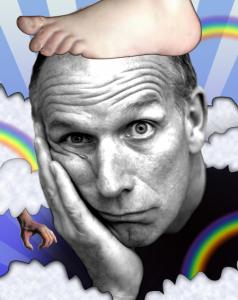
John Cleese said of Graham Chapman, "Gray ... embodied and symbolised all that was most offensive and juvenile in Monty Python." To those of us who were teenagers in the heyday of the Pythons, it is important not to underestimate that 'offensiveness'; it was that which made them, in comedy terms, as important as Marcel Duchamp or the Sex Pistols. They cocked a snook at polite society. And the biggest snook-cocker of them all was Graham Chapman.
Not The Messiah shows us that Chapman's offending of societal rules was not confined to his comedy, but emanated directly from his life.
After a brief wartime interlude, packed full of the same comical Grand Guignol the Pythons would later relish, the child Chapman decides to become a doctor. Or, at least not a Polish Airman. Quick as flash we are up at Cambridge. Footlights, Cleese, David Frost, Tim Brooke-Taylor, a whistle-stop tour of 70's alternative light entertainment. And Telfer's Graham Chapman is the perfect guide.
With economy, precision, and a razor-wit, the actor - while never resembling Graham Chapman - nevertheless embodies his spirit perfectly. He delivers a master class in the art of the one man show. He is chatty, relaxed and every line is imbued with the polished spontaneity of the seasoned performer. Most of all he honours Chapman's memory by highlighting the man's innate contradictions - intellectual yet silly, a lifelong drunk capable of sober thought, the gay man who took delight in portraying the straightest members of society. In short, a self-deprecating comic genius.
Of course, credit should also go to Tom Crawshaw's very funny script, which gives Telfer ample space to inhabit the character fully. It takes us on a journey through a packed, but too short life, while never leaving the hospital in which the painfully ill Chapman is being treated. Furthermore, he recognises that for many of us, much of the Python material is so familiar, that he only has to allude to it to make a point. Thus, Chapman's father becomes one of the four Yorkshiremen, King Arthur comments on Chapman's quest, and a brigadier is constantly on hand for when things become too silly. Many of the most moving passages are undercut by being delivered by comic policemen, which renders them all the more moving.
It is worth pointing out that this ultimately tragic tale is very, very funny. The final irony of Chapman, a long-term alcoholic, being finished off by throat cancer caused by his pipe smoking is especially poignant.
Go and see 'Not The Messiah'. You'll laugh like a drain, wipe away a manly tear and leave safe in the knowledge that the social mores that constrain and constrict our lives are really not all that important. To many, George Telfer is fringe royalty. I'd like to say he's better than that. On the basis of this performance, he just may be a very naughty boy.
Malcolm Lomax
ONE SUNNY DAY by Claire Spratt - Planet Rabbit Productions

I was very much looking forward to this, the third production featuring the family of Claire Spratt , founder of Planet Rabbit Productions, and I wasn't disappointed.
'Blitz Bride' introduced us to Ruby and Henry (Claire's Grandparents) and their war time courtship and his subsequent proposal. In 'I want to hold your hand' the story moves to the 1960's and Ruby and Henry's daughter Sylvieann's excitement at gong to meet the Beatles. 'One Sunny day' and we are in post decimalised England and Ruby and Harold have bought their dream holiday cottage '10 minutes from Whitby', Sylviann is married to Clifford and have a Son, Timothy.
The cottage may not be everyone's idea of heaven but Henry and Ruby are 'living the dream'. They had wanted a little project, something to do at the weekends - and somewhere Sylviann and Clifford might bring little Tim for holidays. It doesn't need much, a cooker, fridge, a bathroom - including walls! And they can soon make a window to fill in the hole in the ceiling. It will be best if Sylviann and Clifford don't come until it is all done up and habitable, or they will think they have gone mad! But of course, it being a Sunny Day, Sylviann and Clifford go out for a ride in their Morris Traveller and drop in on Henry and Ruby. There not being many home comforts yet a picnic on the beach is decided up on.
Of course there is much more to this trip down memory lane - what exactly are the plans for the cottage? What are the neighbours like? Is there a ghost upstairs? And what of the Cod Bandit?
The characters are brought beautifully to life by this talented ensemble cast. I understand the real 'Clifford' saw the production and declared 'yes that's how it was'! Ruby struggling to get to grips with 'this new money' - 'nobody wants it, only Wilson, everything's been rounded up'. Ruby on the beach in full matching skirt and jacket with fancy blouse, large hat and chiffon neckerchief, taking off her tights; Henry with his cine camera, filming everything ; Clifford with his boots and trying to be the 'man' but not quite making it, and Sylviann stoically keeping them all together. All of which transports those of us who remember, back to the day. Clever, witty dialogue paints a wonderful picture. Good music choices jog the memory and, as ever, the meticulous attention to detail means the props, wardrobe, and ingenious stage settings bring this slice of British family life in the 70's in to focus.
I loved the staging and the very slick scene changes, very imaginatively done in such a small arena.
I believe this is the last offering about Henry and Ruby, they are certainly going out on a high. This is a charming, funny and fond look back to a gentler time. Treat yourself, it will be worth it. Thank you Claire.
Linda McAlinden
PATCHWORK LIVES - Arletty Theatre
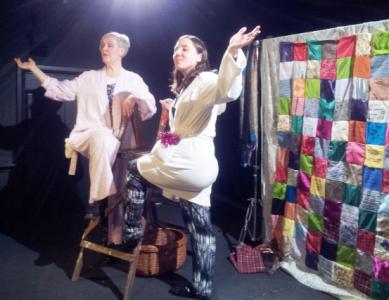
Patchwork lives is a sensitive and charming production that combines beautiful songs, original composition and well-crafted story telling. In the intimate setting of the United Reform Church Blue Room, the duo 'weave' the tale of recluse hoarder Quilter (Imogen Joyce) and her strange but sweet ghost (Anna Sanderson) who together collect stories in their dilapidated home.
When a woman from the council arrives, following a series of complaints from the neighbours, Quilter is confronted with the prospect of losing her home and her stories for good. To relieve the tension, Quilter and her ghost punctuate their own troubles with tales of strong, inspiring women. The lives of Emily Davison, Emily Bronte and Grace Darling (to name a few) are recreated and retold with care and delight.
The performers interact with the cluttered space around them, creatively using an A-frame ladder and a collection of teddy bears to relive the stories events. Joyce is a warm performer, with lots of likeability and a real range to her performance. Her emotive singing was truly wonderful with the ability to convey both sorrow and peaceful joy in her range of lovely folk songs. Sanderson is a quirky and giving actress who provides a chirpy energy to the character of the ghost. Both Joyce and Sanderson shift seamlessly between the art forms including an elaborate mix of live and recorded music as well as projections.
However Patchwork Lives isn't all teddies and singsongs, some of the stories are truly affecting and powerful. I particularly connected with the description of the recent assassination attempt on Pakistani schoolgirl Malala Yousafzai, and artist Artemisia Gentileschi's self-portrait of Judith Beheading Holofernes.
I do feel the form of the piece could do with some tweaking, as the play does loose steam towards the final third. This could be down to the structure as although the piece has a running narrative it comes across as pretty disjointed and episodic. Whilst the short feminist tales are enjoyable it would be beneficial for the momentum of the show if they linked some way or impacted on the main story.
There is something quintessentially 'Nottingham' about this production both in the actors themselves and the nature of the stories told. The people of Nottinghamshire, who contributed their stories during the script development process, have shaped the play and speaking as a Nottingham girl, I felt right at home. But there is something more universal in this piece and that is the urgent need to keep these stories alive, so that future generations may learn from their message.
Sian Dudley
PEACEFUL by Polis Loizou - The Off-Off-Off-Broadway Company
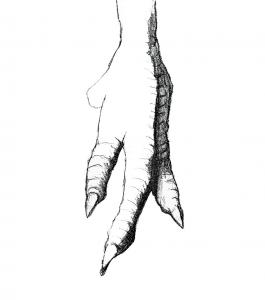
This new piece of writing from the Off-Off-Off Broadway company was partly inspired by the story of Sarah Winchester and the well known tale of the Winchester mystery in America in the mid 19th Century. In this play the spinster Miss Charles lives in a sprawling house where terrible apparitions appeared to her and....... Well I won't spoil the plot.
Both eerie and slightly surreal, the cast of three performers deliver a 'tales of the unexpected' story in the small paupers pit space with a chilling mood. The piece starts with the figure of Miss Charles, dressed head to toe in black and covered in a white lace veil, hiding her dark and vicious secret. She proceeds to explain the backstory to the great house and how she keeps hearing strange murmurings from within the walls. The play then picks up with the arrival of the enigmatic and slightly sinister Mr Devilliers. The spiritualist opens up the wound that the devious Miss Charles has been hiding for years.
The house itself takes on a character of its own and there are many twists and turns.
This is a wordy piece of theatre that relies often on backstory and verbal explanation of events rather than showing them; it would certainly work as a radio play, and there's no doubt that there is an intriguing tale to be told here.
There a few genuine moments of suspense that unnerve those of a slight disposition, and it is to the performers credit that they manage to sustain the tension for 45 minutes.
PRESENT APOLOGIES - All Singing All Dancing

Anyone who has attended the committee meeting of a student society, local charity or council will have had their fair share of personality confrontations, circular arguments, and exasperated moments of forehead-to-table surrender. Such is the case with this group of misfits, who have dutifully gathered to discuss the future of female toads in Derbyshire.
The character setup is straightforward enough: Mr Pedantic is pedantic, Mrs Antagonistic is antagonistic, and Ms PC destroys any attempts at casual conversation by renaming all she deems inappropriate ("shall we have a comfort break?"). Meanwhile, Mr Disruptive is perfectly comfortable with conducting a network of liaisons with various women on the phone for the benefit of all attendees of the meeting. It's fairly formulaic, but good fun, and grouped together such a disparate bunch of characters make for an entertaining dynamic. Much of the cast are faces from the local arts scene, and individually they've got their characters down to their mannerisms and nerviness. Joe Kelly makes a wonderfully caustic Ms PC, and the catty interchanges between Mrs Antagonistic and Miss Lush (with interjections from a disdainful Ms Environmentally Friendly) break up any promising development of productive committee discussion. It's a set-up in which all the committee members' opinions of one another are laid bare, and the face-to-face protocol of polite interaction is more or less abandoned.
At just over thirty minutes the piece may feel brief; by the end of it no real plot emerges, and as a result Present Apologies remains more of a long sketch - an exposition of dissimilar character stereotypes. Nevertheless, it's light-hearted and enjoyable, and the Beltane café-bar makes for a convivial venue.
Colette Talbot
RAFFLES: ONE HEART AND MIND - Act-IV Theatre Company

These days, Raffles is a name probably most readily associated with luxury hotels so it is interesting to learn some more about this fascinating man. Sir Stamford Raffles is a classic figure of the early Nineteenth Century, his values formed along Enlightenment lines, his life was that of the Romantic era, a man determined to follow his own course. A friend of William Wilberforce he was responsible for ending slavery in the Far East.
This play with songs has been devised by the company to cover the last twenty years of Raffles' life from his first appointment to the Far East. We follow his progress as his career ascends for ten years of success in Penang and Java, before the loss of his first wife and the jealousy of rivals within the East India Company led to campaigns to discredit him. His later years were tinged with sadness as he fought to clear his name, while four of his five children died in childhood. Yet he still managed to establish Singapore, for which he is best known today.
It is a capable cast, Andy Pritchard is a strong Raffles and Helen Barter keeps the action moving along as the narrator and both of Raffles' wives (!). Richard Cleghorn-Brown plays a collection of military types as well as having written and arranged all the music, and I particularly liked Dave Headey's collection of ne'er-do-wells and schemers, all played with great relish - including Napoleon, who Raffles met on St Helena on his return to England in 1816. The songs are well performed and neatly punctuate the action as well as introducing some emotional depth to the characters. The one jarring note was the rather caricatured portrayal of Tunku Long as a comic oriental, which drew a few laughs but felt uncomfortably dated.
The programme states that the prime objective of the play is to maintain historical accuracy, and it is very interesting to learn more about this fascinating man. However, it's impossible to know everything about a man and sometimes a little informed speculation may add some more human interest to the story. It was intriguing to learn that Raffles' first wife was buried alongside his best friend, John Leyden, and the inscription on the tombstone was taken from a poem she wrote to Leyden... there's a story in there!
Raffles: One Heart and Mind is an entertaining run through the life of a charismatic man central to Britain's influence in the Far East in the early Nineteenth Century.
Steve Walker
RED RED SHOES - REC Youth Theatre Company

We see the REC Youth Theatre Company return to the fringe this year with a challenging piece of dance theatre, written by Charles Way, inspired by Hans Christian Andersen's fairy tale of the girl who danced herself to death.
The REC have created an emotional piece of drama that tells the story of Franvera, who lives in a country where two factions are fighting. She is a girl with red shoes, who feels that her actions have a pivotal effect on real life events, like the death of loved one or the saving of a friend. It is a child dealing with the turmoil of war and the need to have some control.
As the audience was invited into the studio we saw the acting space surrounded by piles of shoes, clothes and props, which the actors used throughout the piece either to become other characters or to represent the presence of other characters on stage. I loved the way shoes and boots carefully placed became extra cast members in the acting space. The colour red was used not just for the red shoes but a red beard, red feet, red suitcase, red child's jumper, Mother's red scarf, Dad's red blood stained shirt...
This piece started a little too quietly, the voices struggled to be heard over the music. However as the actors grew in confidence then the story telling gained in pace, which was only slowed by uncertainty over lines at times.
Five talented actors played all the parts. Annie Osborne who played the bread lady, amongst other roles was a captivating actor. She took on each character with confidence, and all had a clear physical and vocal distinction. Ellie Burke was an engaging Franvera who the audience felt real sympathy for. However the dances, to me, lacked the passion needed to convey that this was a girl possessed by the power of the red shoes and their seeming ability to change events. Holly Chetwood, and Cameron Mackay each had a strong stage presence and made great parents. Matt Sargeant had some excellent characterisation skills; but his insecurity with the script showed at times.
This show was an excellent piece of storytelling presented in an interesting style. The first night audience was left visibly moved by the ending. I believe that as the run continues the cast will grow in confidence and the piece will become a whirlwind of energy and pathos.
Jayne Marling
SCARS UPON MY HEART - Hush Hush Theatre Company

It is no secret that Vera Brittain didn't much care for small-town, provincial Buxton - her progressive political views meant that she felt out-of-place. Buxton, however, has always been very proud of its association with Vera and her brother Edward, who is remembered on the town's war memorial. So bringing a new piece on the war-time experiences of Vera to Buxton is a smart marketing move.
Happily, Scars Upon My Heart is much more than a piece of shrewd marketing. This performance was the world premiere of a work put together by four members of Hush Hush Theatre Company - recent graduates of the University of Derby (and congratulations on your degree results!)
Vera is played by three actors who are on-stage for the whole piece. Rebecca Evans describes Vera's relationship with Victor - one of her 'Three Musketeers'. Katy Dent explores the relationship with Roland - Vera's fiancée - and Helena Rimmer provides an account of Vera's life with brother Edward.
Having the three actors working together allows scope and opportunity to develop different voicings and for some imaginative interplay - so what we have is much more than three solo voices speaking to us. For example, Rebecca, Katy and Helena sing carols and popular songs and their voices harmonise well. In another, early, scene tea-cups and spoons are used to create a rhythmic setting for text that cuts through the banality of pre-war middle-class life.
The actors were clearly a little tense about the first performance - especially in an unfamiliar space - and the delivery was a little hurried at times. However the wordy script - drawing on Testament of Youth and the poetry of other women - is always clearly produced. Having got this first show out of the way it is probable that a more relaxed performance will emerge. Many will be familiar with the stories told here but they are related with imagination, clarity and fluency and remain a moving and rewarding experience. Hush Hush Theatre Company is one to watch out for.
Further performances of Scars upon my heart take place on the 5th and 7th of July.
Keith Savage
SHADOW ON THEIR WALL - Sheepish Productions

The review of this show has been removed at the request of the company.
SOFTEN THE GREY - 6FootStories

Attacking the text like their life depended on it (and in some respects it did) this brand new piece of abstract theatre entertains in great measure and then suddenly turns to twist the emotional knife. As a dead diver turns up at the Citizens Advice Bureau for the deceased, he is grilled and interrogated by the devilishly eccentric and slightly devious receptionist. The choices laid before the dead man are acted out in a very slick sequence of fast paced flashbacks ( instigated by a fabulously simple device of a hotel desk bell) the relationship between the two actors generates so much energy and focus that ultimately pulls you into their philosophical debate: if there is a God, how much power does he/she have, whatbdoes eternal paradise look like and how appealing does reincarnation as a Fainting Goat sound?
The writing is quite exceptional; fast, clever and without falling into cliches or pretension, the two actors bounce off each other with precision and brilliant comic timing. For a piece that deals with some very heavy issues, it switches from an excellent sequence involving a 'shoal' of fish jokes to a moving account of a father and son relationship played out to a mix tape of Queen's classic hits on the M4. There are plenty of cultural references that overlap and weave into the narrative, including a very funny game show parody called 'Life after Death' complete with Family Fortunes catchphrases.
This is before I mention the 'sitting on God's lap' scene which is played straight down the line and is worth the ticket price alone. The piece rattles along until you worry it's going to run out of steam but it produces a wonderfully cathartic ending as the two characters finally recognise the need for each other and the final decision has to be made as they contemplate the after life.......
Confident and engaging performances from Jake Hassam and Nigel Munson, it plays out like a strange mash up between Eternal Sunshine of the Spotless Mind and It's a Wonderful Life; catch either of the last two performances at the fringe and it'll be an hour of your life you won't want back. You'll be 'singing, laughing and basking' in their glow.
Jason Hudson
SPOONFACE STEINBERG by Lee Hall - Freerange Theatre Company

Spoonface Steinberg is a play about a seven year old autistic girl with cancer, which may not sound promising. But fear not, it is a wonderful play that steers clear of mawkishness as it takes a clear-eyed and optimistic look at what it means to be alive.
From her hospital room, Spoonface tells her about her life chronologically from her birth up to the present. Her child's perspective, while sweet and innocent, is also acute and unsparing, as we see the impact of her autism and her later illness on her family and those around her. The scenes are intercut with songs by Maria Callas, which adds a haunting beauty and grandeur to Spoonface's stories, as she meditates in her idiosyncratic way about death and, more importantly, about life.
Spoonface Steinberg is written by Lee Hall, better known for Billy Elliot, Pitmen Painters, and the War Horse screenplay. Originally written as a radio play, it is the work that first brought him to wider attention. The concern with an adaptation of a work designed for radio is that it becomes a static talking head piece, but director Hugo Chandor has done a superb job in bringing it to the stage. The set with its hospital bed, screens and instantly recognisable hospital furniture is simple but perfect. During the arias by Callas that Spoonface listens to - in the opera it is important to die well, she says - she concentrates on the music or plays along to it with such intense mindfulness that it adds a level that could not be achieved on radio. And without giving anything away, the ending is handled in a beautifully neat and understated way.
The part is a huge challenge for any actor, on the radio a child can play the role and there can be many takes and lots of cutting, whereas on stage an adult has to convince as a child alone on stage for the entire performance. Rebecca Fenwick puts in a wonderful performance as Spoonface, her transformation into an autistic seven year old is remarkable (particularly if you wait for the Q&A afterwards and see it in reverse - it's quite startling to see Rebecca appear as herself). Her earnest and eager to please manner is nicely contrasted with a matter-of-factness in delivery that works well with Spoonface's logical approach to the world. She builds a friendly and direct engagement with the audience and when playing captures the concentration and care that a child takes in creating a make-believe world.
Spoonface Steinberg is a delightful play, both funny and moving whilst avoiding sentimentality. It was a big hit with its audience almost all of whom stayed around for a Q&A session 10 minutes after the performance. This will be one of the hits of the Fringe this year so make sure you don't miss out.
Stephen Walker
THE FIRST SIGN OF MADNESS - Chris Neville-Smith
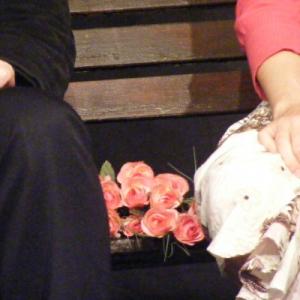
This play opens with Joanna (Nicki Noble) and Craig (Chris Neville-Smith) sitting on a park bench with Joanna clutching a large bunch of tulips. Joanna sets the scene beautifully describing the electric pylons and cooling towers and admits she has dreamed of this moment!
She then expertly leads the conversation telling Craig everything she has always wanted to tell him, berating herself for not saying it sooner. Her sometimes amusing dialogue follows her relationship with Craig, the emotional turmoil and happy and sad moments. She demonstrates her love for him and her frustration at his seemingly passive approach to Sonia and his multiple break-ups with her. Craig sits, looks and says nothing in response and his facial expressions give little away but you start to make assumptions about who or what he is or isn't. The hints are subtle and you are never quite sure.
Alan Godfrey as the groundskeeper offers several clues to the situation, perhaps too many, but you are engrossed in Joanna's story which is both passionate and contrite and start to hope that the ending is not as you feared. But it is.
This was a very thought provoking play about wasted opportunities to say how you feel and although it leaves you with an overwhelming feeling of sadness, is very well written and portrayed. Worth a visit.
Sandra Cooper
THE GAMBIT by Mark Reid - Rampant Plays

Anatoly and Garry. Two great chess grandmasters and former friends meet for the first time in 25 years with the bitterness from their last confrontation still raw. Why are they meeting now and can they salvage their friendship? Those with knowledge of the chess world will pick up on the names and scenario and recognise that the play is based on Karpov and Kasparov, but that is just the jumping off point for this imaginative reconstruction.
This is a very intelligent, erudite play by Mark Reid in which two very different world views are placed in conflict. Anatoly the introvert sees the world as a game - he loves to play games and struggles to cope in a world not bounded by similarly tight rules. Whereas the more gregarious outward looking Garry has given up chess to enter politics in Russia, and has moved on in a way Anatoly cannot. For Anatoly chess is all he has in his life but he has no-one to play with, for Garry it is where he feels safest. For each of them the other is their worthiest opponent, and chess their natural home, their tragedy is that they no longer trust each other.
The play is wordy, but in the very best sense as one that would be fascinating to read. These are two giants arguing over their philosophies, both personal and political. It is not dry, there is plenty of emotional heft, particularly in a remarkable long speech by Ben Rigby as Anatoly, in which the energy levels are ratcheted up and then deflated. Rigby's performance as the tragic genius is superb, by turns arrogant and pleading, his game-playing getting in the way of rebuilding the connection he craves. Nick Pearse plays Garry with solidity and confidence, but cleverly conveys the sense that Anatoly is the only man that can get under his skin like this, and in his own way haunted by his defeats and a thwarted triumph.
Often Fringe plays have a tendency to veer towards monologue, so it is great to see two fine actors bouncing off each other and creating that unique on stage energy. It is helped by the setting in front of the window in The Old Clubhouse; it's very easy to imagine them in a luxurious lounge in Anatoly's dacha.
If thoughtful intelligent theatre is your thing then this is definitely a must-see at Buxton Fringe 2013, an intense battle of ideas and ideals against the background of fractured friendship, performed by two excellent actors; you're unlikely to see anything else quite like it.
Steve Walker
THE HARPINGTON TOAD FANCIERS' SOCIAL - Nuts & Bolts Theatre Company

I wasn't quite sure what I was expecting when I first arrived at the Hydro to watch The Harpington Toad Fanciers' Social. I knew we were going to witness the first ever social event that the Toad Fanciers had ever held - the area of the Hydro that was used worked perfectly as the setting for Norman's flat where the Fanciers were to meet. We learn very quickly that the group are somewhat nerdy and they all have their little quirks - it is very clear that the cast are enjoying what they are doing and they play their characters beautifully well. But what also becomes apparent is that there is more to each character than meets the eye, leading to several moments in the second half that I really didn't see coming!
This is a modern version of an old fashioned 'laugh out loud' British comedy, with plenty of innuendo and hilarious visual gags. I confess there was one small moment in the second half where a piece of innuendo felt a little overworked, but apart from this I felt like I was watching a very well written and well performed comedy. I might not have been certain of what to expect when I first arrived, but by the end of the performance I'd had a good laugh and a thoroughly entertaining afternoon!
Emma Thompson
THE LAST MOTEL - Sheepish Productions

Sheepish productions return to the fringe with this brand new two-handed black comedy that aims to address some fundamental questions of the possibility of redemption by faith. The story kicks into gear after widowed drifter Abalone accidentally knocks down a woman on his escape from a failed heist. With the cops on his tail, he panics and takes the woman hostage in a cheap motel in Barnsley. But things take a turn for the worse as she isn't all she's cracked up to be.......... the two characters square each other up after their initial distrust of each other and they debate some philosophical issues about redemption and faith in god. Abalone is forced to face up to some home truths about his past and his life as the kidnapped woman reveals some uncomfortable dilemmas for him to ponder. The script takes some twists and turns before finally revealing the denouement..... But to give this away would be unfair. Amiably performed by the two actors, this new piece of writing illustrates the essence of the fringe and gives this company a solid platform to experiment with their work. At its conclusion, Abalone's choices are magnified and this play throws up many ethical questions but provides very few answers. This seems to be the point as in life we are constantly having to make choices, but there will always be a consequence.
Jason Hudson
THE SHOW - Momentum Theatre
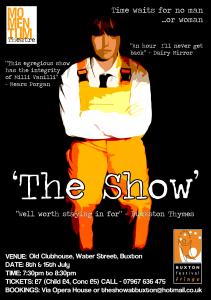
'Time waits for no man, so the saying goes. Or for no woman either. It's certainly true for these four men (well, three men and a woman actually) as they fight against the clock to get 'The Show' ready on time'. This is what the blurb said of this production, I am not sure that they won.
We were late being shown into the venue and once there it soon became clear that all was not well. The actors came on stage, then realised none of them had started the music. The audience gave them permission to start again - which they duly did! Then, following the dramatic, slow motion, silent opening the one and only line was 'fluffed'! Then chaos ensued as they tried to get themselves back on track for the performance for us.
I was probably not the target audience for this very personable group of 4 young people. Perhaps it is a mark of how good their performances were that I wasn't always sure what was scripted, improvised or if they had forgotten what they were doing! There are some original ideas on show and the audience were encouraged to be involved and did so with good grace - but we were all of an age and I am not sure that they were always sure about what was going on either.
Still, they had worked very hard and there was a beginning, middle and end. It wasn't offensive and a lot of it was very funny - though maybe not in the way they had intended. You should probably go and make up your own mind. I enjoyed it - I think!
Linda McAlinden
THE UNKNOWN LAND by Caroline Small - Cotton Grass Theatre
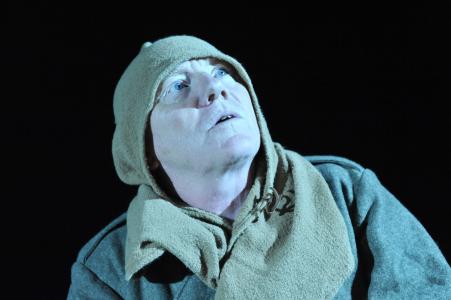
This well-executed piece from writer Caroline Small is a pleasure to experience, and at just under two hours, it's easy to achieve a full sense of immersion in a story that follows a nineteenth-century sea-expedition through polar waters.
David Frederickson delivers a consistently robust performance as he slips easily between characters; the result is an engaging and multi-faceted narrative that steers away from an interior monologue. Transitions between characters are smooth, but the central figure here is that of Samuel Straw, stranded in a vast wilderness indifferent to the tiny actions of man, and forced to confront a previously unimagined solitude. This is an introspective piece that projects the inhospitable Arctic as a harsh physical manifestation of an interior landscape: The unknown Land is as much a piece about self-examination as it is about wanderlust.
The text moves from humorous accounts on-board the expedition vessel, and anecdotes from Samuel's childhood, to startlingly beautiful moments of language, from a description of belugas passing beneath the ship, to the Inuit interpretation of the Northern Lights as 'a thousand torches... lighting the feet of the dead as they cross the bridge to the heavens.' The incorporation of Inuit folklore is used to excellent effect; the story of the raven paddling his kayak into the mouth of a whale to find a girl who dances to the rhythm of the creature's beating heart, or that of the lynx who, driven to hunger, cuts away strips of his own flesh to nourish himself - a cautionary tale of the loss of the self in the ruthless pursuit of self-preservation - acquire poignant significance over the course of the play. However, it is Keith Kendrick's musical interludes that give the piece true wallop - haunting English folk songs are beautifully delivered.
The Unknown Land is a reminder that the wild is relentless and unforgiving; it is a play that works particularly well at our moment in history, in which it seems all too easy to forget the 'true' nature of a wilderness that, despite human encroachment and technology, has never been fully tamed.
Colette Talbot
THE ZOO STORY - Sudden Impulse Theatre Company
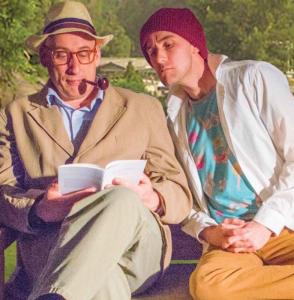
Peter, a man of middle class and middle age, retires to his usual bench in Central Park for a little time to himself where he can relax and read. He is soon joined by Jerry, scruffy, younger and clearly on edge. Jerry initiates a conversation, he wants to talk about what happened at the Zoo, Peter is a little exasperated but forbearing and he sets his book aside and listens to what Jerry has to say.
But as Peter says, Jerry doesn't carry on a conversation he just asks questions. Jerry is more intelligent and perceptive than it first appears, he gets under Peter's skin, invades his personal space, and tells stories that may or may not be true. He is by turns provocative and conciliatory, as Peter gets more confused and fearful.
This is an intense and powerful short play by Edward Albee, who is better known for Who's Afraid of Virginia Woolf? It is a difficult piece and fortunately there are two remarkable performances. Initially at least, Liam King's portrayal of Jerry is the more eye-catching, all repressed energy and nervous tics, it is a mesmerizing performance and it is almost impossible to take your eyes off him. If you do, however, you'll notice how Richard Shields is delivering an impressively subtle performance as Peter, gradually losing his composure as Jerry's insights and provocations begin to psychologically undermine and unpick him, until he reaches breaking point.
Credit must also go to Simon NW Winterman for his control and pacing as the tension is ratcheted up and Jerry delays and delays telling the zoo story. Sudden Impulse's production of a disturbing play that you will be thinking about long afterward is taut and almost unbearably tense, it is superbly realised and really should not be missed.
Steve Walker
TITUS ANDRONICUS: AN ALL-FEMALE PRODUCTION by William Shakespeare - Smooth Faced Gentlemen & Three's Company
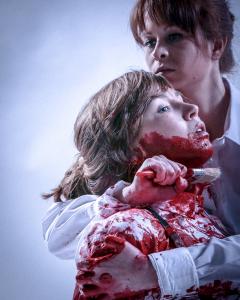
There's a phenomenon in the music industry, commonly known as 'the difficult second album' - where an artist has had a huge hit with their first release, how do they follow it? The first time around, they had novelty on their side - how do they come up with something that will meet the expectations of their audience again? This phenomenon could be argued to have affected the Smooth Faced Gentleman, the highly talented all-female Shakespeare troupe who exploded on the Buxton stage last year with their hugely enjoyable and critically acclaimed Romeo & Juliet. And it has to be said, they have conquered any worries that lightning wouldn't be able to strike twice.
Where Romeo & Juliet, with its youthful characters, made for a relatively easy transfer to the all-female environment, you couldn't have picked a more challenging follow-up than Titus Andronicus - about as testosterone-fuelled a show as you might imagine, full of macho posturing and pride, to say nothing of murder, mutilation and rape on a staggering scale. But the company pulls it off brilliantly, Indeed, the female perspective (when they're not onstage, the company are always visible) makes us look again at the main thrust of the plot and see it for the horror it is - rather than glorying in its excesses as is sometimes the case.
In the title role, Henri Merriam is a swaggering, imposing figure - a quite appalling judge of character who sets in motion the blood feud at the play's core - she is most effective as her life unravels, increasingly petulant and uncomprehending, like a small boy. Ashlea Kaye brings enormous sensitivity to the role of Titus' brother, Marcus, and Leila Sykes, makes the almost impossible character of Lavinia work in a deeply touching manner. The excesses of the plot can be ludicrous at times, and it is a testament to the company and director Yaz Al-Shaater that they bring humanity to the piece, whilst also grabbing the opportunities for humour when they come - Francesca Binefa uses her comic skills impeccably as the psychopathic Saturninus (and in her we also get a cameo appearance of her Spanish Nurse from last year!).
The most potentially difficult role to modern audiences must be Aaron, the villainous Moor, but Vivienne Acheampong, pulls it off. Shakespeare's use of a black character is intriguing as, on the one hand, he is conceived as somehow sub-human, but in another, whilst the white characters react with animal instinct throughout, Aaron is the only one who plans, who plots, who manipulates. Here, in Shakespeare's first tragedy, is a prototype Iago, a prototype Edmund, a prototype Richard III - a smiling schemer who takes the audience into his confidence whilst setting atrocities in motion. Here also, however, is a character who will do whatever is necessary to protect his child. Ms Acheampong plays the contradictions well - perhaps she could relish her villainy a touch more, but I believe as she and the other performers grow in confidence, their characterisations will grow in stature too.
The posters for Titus set out the play's stall well, with the gore laid on with a paintbrush. This is the abiding motif of the production, a brilliant conceit which allows the play to retain its visceral strength without being disgusting. Brushes become swords, daggers, knives - at one stage paint rollers take the place of spears - and the blood flows freely - beware the front row!
There is no question that with Titus Andronicus, the Smooth Faced Gentlemen have leapt the hurdle of the difficult second album with flying colours (most of them red). I can't wait to see what this company come up with next.
Robbie Carnegie
TOMORROW'S DAWN - La Petite Famille (The Little Family)
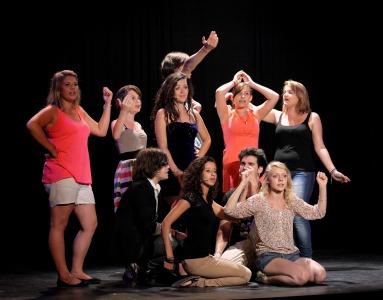
Don't miss this spectacular performance which is brilliantly entertaining, thoughtful and insightful, and at times funny.
It opens intriguingly with a solo from one of the female teenagers, while an older man passes back and forward putting food in her mouth and giving her mugs of drink, and you wonder what is going on. Then a group of male teenagers chat about their revision, followed soon by the entrance of some teenage girls, and some interaction and flirting begins. The boys sing about courting, and do a bit of macho air guitar playing before all the young people appear sitting at desks in class, and the teacher tells them their homework was bad. A dramatic glamorous solo and dance follows from the 'teacher'.
Next is an interesting exchange between one of the girl's father and her friends exploring the struggle children and parents have to understand each other, and the perceptions around each other's obligations. It moves to a telephone conversation between one of the girls and her grandmother, powerfully telling the inner struggles, as she says: "I'm 15 years old, and everything annoys me" and "he never listens to me", "he pisses me off" as grandma tries to mediate. Then an exploration of the relationship between 2 sisters as one recognises that the other is 'in love', and on to the relationship between the girl and her boyfriend.
The relationships are explored through song, and shows how song brings people together as the pupils see a different side to their teacher. The characteristics of the class students are explored, the high achievers, the flirt etc, and brilliant touches of comedy deal with issues like one of the boys showing others how to tackle the first kiss with his girl, and later trying to compose a poem for their girls. It implores the audience to open your ears, and open your eyes to our beautiful smiles and you will see.....
.All the nuances and difficulties of getting through the teenage years are brilliantly portrayed by this immensely talented cast of 6 girls and 3 boys in their polished and emotive performances. Great music and song, energetic and stylish dancing, expressive acting and humour are used to explore all the issues and difficult relationships and emotions around being a teenager - the support mechanisms, friendships, emotional relationships, parent child relationships.
The Company, La Petite Famille, was formed in middle school in Souillac, in France, in 2007. Specialising in musical theatre, actors aged 15 to 21 perform original works in France and abroad.
The superb performance is endearing, expressive and the young performers dance stylishly, sing beautifully, act with depth of understanding and passion you would expect of more experienced performers. Don't miss this fantastic production in the Arts Centre Studio, Buxton on Tuesday 9 and Wednesday 10 July at 8pm.
La Petitte Famille then take Tomorrow's Dawn to Rose Theatre, Kingston-upon-Thames 21 july -23 July, and the International youth festival at the Lemon tree in Aberdeen on 29 July
Jacqui Roote
VIENNA - Gerundagula Productions

A trip back in time to the late 1980's with Barry, the Ultravox fan with a number of issues to resolve with former girlfriend Annabelle. He can't work out for himself if he was selfish or selfless in his previous relationship, but Bella has her own ideas. She also wonders if Barry is just an unemployed nobody or someone waiting for the right opportunity to become the pop star/actor to play the starring role in the highly successful story that is his life.
Award winning writer Mike Francis Carvalho has carefully crafted the complex characters of Barry (played by Amir Rahimzadeh, notable at the nasty in-car smoker on the recent NHS TV anti-smoking advert) and Annabelle (played by stand-up comedy actress Sharon Heywood). In their up/down delivery of often knotty dialogue, they punch you in the stomach and stroke you gently straight afterwards. They create an air of tension so taught it can be cut with a Wham! video and almost immediately release humour with distressing ease.
The influence of Ultravox front-man, Midge Ure is apparent as a guiding force for Barry, the man who dances with tears in his eyes. But it is William Shakespeare that provides the clearest messages for the mixed-up rocker with two of his most celebrated quotes: All the world's a stage and if music be the food of love.
Barry needs to come to the right decision about his future: will he follow the wise words of Midge or the age-old insights of the Bard?
David Carlisle
VOLGA OLGA'S NIGHT OF RUSSIAN CULTURE - Crowd of Two Theatre Company
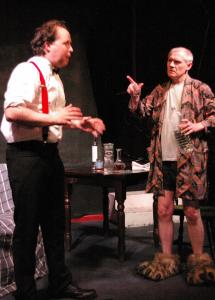
Having had the KGB mind reader Boris Nicoli experience earlier in the week I thought I might risk over-exposure to cod-Russian theatre and comedy by going to see Volga Olga - happily I need not have worried.
The Hydro is hosting a busy programme of events this Fringe and whilst easily found in Spring Gardens as one member of the audience confided last night "I don't usually get past M&S". So be brave, adopt a pioneering spirit and continue 100 yards!
Now "Volga Olga" seems to me to suggest a coarseness that doesn't accurately reflect the mood of the whole evening's entertainment. Yes, the framework for the programme is "A Cabaret of Chekov Comedies" and our hostess, Olga, is brash and her sidekicks are simpering. But once we get beyond that at the heart of the show is three longish dramas seriously presented.
The dramas are comedic in tone at times - but as one character observes "this isn't comedy, it's tragic" - any laughs have a bitter taste as we observe characters who are often miserable and oppressed. So in "Tobacco, a peril to us all" we are invited to a lecture in which the speaker spends most of the time opening his heart to us about how miserable his life is because of a domineering and unsympathetic wife.
In "A Friend in Need is a..." Ivan is desperate to kill someone - possibly himself - so burdened is he by the demands and expectations of others. "The Debt of Honour" ostensibly has a happy ending but a lot of misery is uncovered en route.
Nicola Haldane, Daniel Jeffrey and Russell Kennedy (Crowd of Two Theatre Company) are energetic and fully-committed in this production. Maybe the agonies and despair of some of the characters could have been expressed without recourse to so much loud proclamation - other dramatic tools may be available. Also at times I was reminded by something from Trevor Griffiths' play "The Comedians" - there is a line in that asks "is this a joke that hates women?" At heart these stories seem to hate women and I'm enough of a feminist to be discomfited by that. However, for £6 (£5 concessions) and a full two hours of close-up entertainment this has got to be a Fringe bargain.
Keith Savage
WAITING FOR - Sudden Impulse Theatre Company

Alongside highly acclaimed performances of Edward Albee's a zoo story, Midlands based theatre company Sudden Impulse are also staging an equally powerful new writing by promising young Nuneaton actor Jack West. Jack is currently studying for a full time degree at the prestigious Liverpool Institute of Performing Arts and we are extremely privileged to have five opportunities to see his work "Waiting For" at Buxton, having been shown in his home town of Nuneaton, and at the Lighthorne Drama Festival.
The work examines the relationship between two men connected by their relationships to the same girl, one the father the other the boyfriend, played by Nuneaton theatrical stalwart Ray Durkin and up-and-coming actor Sam Hudson, and directed by Kegs college lecturer Simon Winterman. Simon has previously directed two productions at Buxton Fringe Festival both of which have been nominated for awards and one of them, The Maids, won the award for best production back in 2008.
Simon said "I am delighted to take these two shows to Buxton and with such a talented local team I hope we can make the town proud."
Following a teenage girl's car accident, her live-in boyfriend and her single-parent father meet in a hospital waiting room. The waiting explores and develops the relationship and understanding between the two men but also exposes some truths about the relationship they both had with the girl.
It opens with the girl's teenage partner poignantly sitting alone on the stage with a bunch of flowers, and when her father joins him in waiting, the exchange between them starts angrily, but gradually softens to concern. Powerful emotions are very strongly portrayed, and leave a big impression on your consciousness.
The behavioural observation in the writing continues, as the play shows how we use banal exchanges to deal with difficult experiences as the 2 men exchange conversation about the traffic and their journeys to the hospital. The relationship develops quickly, and the men are soon talking about the important intimate issues of the relationships between the teenage couple, and the corresponding relationships between the father and the girl's mother, when they were the same age.
Outstanding, sensitive performances explore the emotions and the relationships, and cross the generations as the two men discover what they have in common, explore their individual self doubts, and in this critical time, contemplate the wider issues of god and heaven.
Dont miss this powerful production at the 6pm to 6:45pm Underground Venues 15 Jul 4:45pm to 5:30pm, 17 Jul 10:30pm to 11:15pm, 18 Jul 4:45pm to 5:30pm, 19 Jul
Jacqui Roote
YOU ALL KNOW ME - I'M JACK RUBY! - Clifford Barry
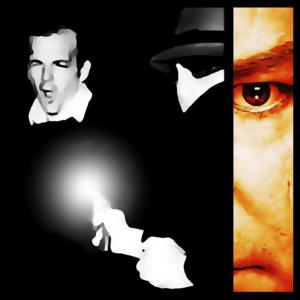
If ever there was a piece of recent American history that borders on the mythic, it's the assassination of President Kennedy. Fifty years later conspiracy theories still abound and it is said, everyone can remember what they were doing when they heard the news. It is an incident that shaped and affected a generation. It certainly affected Jack Ruby. Two days after the event he shot the man being held for the murder, Lee Harvey Oswald, live on national television. In doing so he prevented the truth about the assassination ever coming to the fore, and further fuelled the myth.
Clifford Barry's play examines a man catapulted to the centre stage of world events and presents a tortured soul, more sinned against than sinning.
We first meet Ruby in his secure prison cell; the dingy confines of the Pauper's Pit excellently represent his physical and mental confinement. The action moves back and forth through time and we see Ruby as compere at his burlesque club, giving testimony to the Warren Commission, talking both off and on the record. For much of the play we are hearing Jack Ruby's actual words, taken from court transcripts and other verbatim reports. These have been artfully assembled to build a picture of Oswald's killer, so that by the end of an all too brief hour, we may not be any the wiser on the how and why front, but we certainly know who.
Clifford Barry is an imposing stage presence, sweating profusely in standard prison uniform of red jump suit, defined by his number. He is, by turns, avuncular, needy, misogynistic, deluded, and utterly compelling to listen to.
As in much of Arthur Miller's work, the notion of identity is central, as reflected in the title; central to the individual, but also central to the immigrant experience. Born Jacob Rubenstein, Jack Ruby has rejected his Jewish identity and reinvented himself as an average, upright, American citizen; paternalistic, conservative and with a strong sense of family values. "I did it for Jackie and the kids" he tells us.
But what of that bigger and more sinister 'family', the mafia? Forever hanging over Ruby's story is the possibility of mafia involvement. He once worked for Al Capone, running errands at the age of 12. More tellingly, at that age, he acted as self-appointed vigilante, seeking revenge for his sister's assault. This one incident - thrillingly described - gives us a far greater insight into the psyche of Jack Ruby than the crass, Freudian analysis offered up as explanation by his psychiatrist.
Simply staged, this is a vivid and visceral piece of theatre. Those piercing, pleading, uncomprehending blue eyes peering out of Ruby's sweaty, potato head is an image that will haunt me for a long time. Clifford Barry is nothing short of superb in his portrayal of a man who believes himself to be a hero, but ends up a patsy. His descent into illness, both physical and mental, is tragic, as we realise that the little boy who was a victim of an alcoholic father ended up a victim of something far greater, the American dream.
Malcolm Lomax